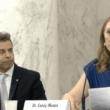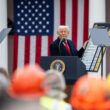Jim Walsh, research associate, the Massachusetts Institute of Technology’s Security Studies
June 19, 2013
It is difficult to know what to make of the president’s speech. Of course, one welcomes his commitment to reduce the strategic nuclear arsenal and his continued support for securing fissile materials. Still, the speech was aspirational rather than practical. He wants a Comprehensive Test Ban Treaty and a ban on the production of the fissile material, but surely he knows that it is unlikely that either will happen any time soon, the former because of a hostile Senate and the latter because of a hostile Pakistan, which has so far vetoed such a ban. And while many of his supporters would endorse eliminating tactical weapons, closing Guantanamo, “controlling” drones, and action on climate change, most of the items on this list were promised four years ago.
In the wake of the revelations about the National Security Agency’s domestic spying, his quote from James Madison—"No nation could preserve its freedom in the midst of continual warfare"—was particularly jarring. On that topic specifically, he emphasized the need for a public debate, a deeply ironic statement given that the program was run in secret and only became public because of a leak. If this debate were so important, why did it have to wait all these years?
The optimist in me hopes that this speech marks a return by the president to his first principles, and that pretty words will be followed by substantive action. The cynic in me suspects that the remarks were aimed at his Democratic base here in the United States, a base whose support has plummeted in the wake of the NSA scandal. The notion of “peace with justice” will certainly appeal to those supporters, but tangible results and promises kept will count for more.
Jim Walsh
research associate, Security Studies
Massachusetts Institute of Technology













